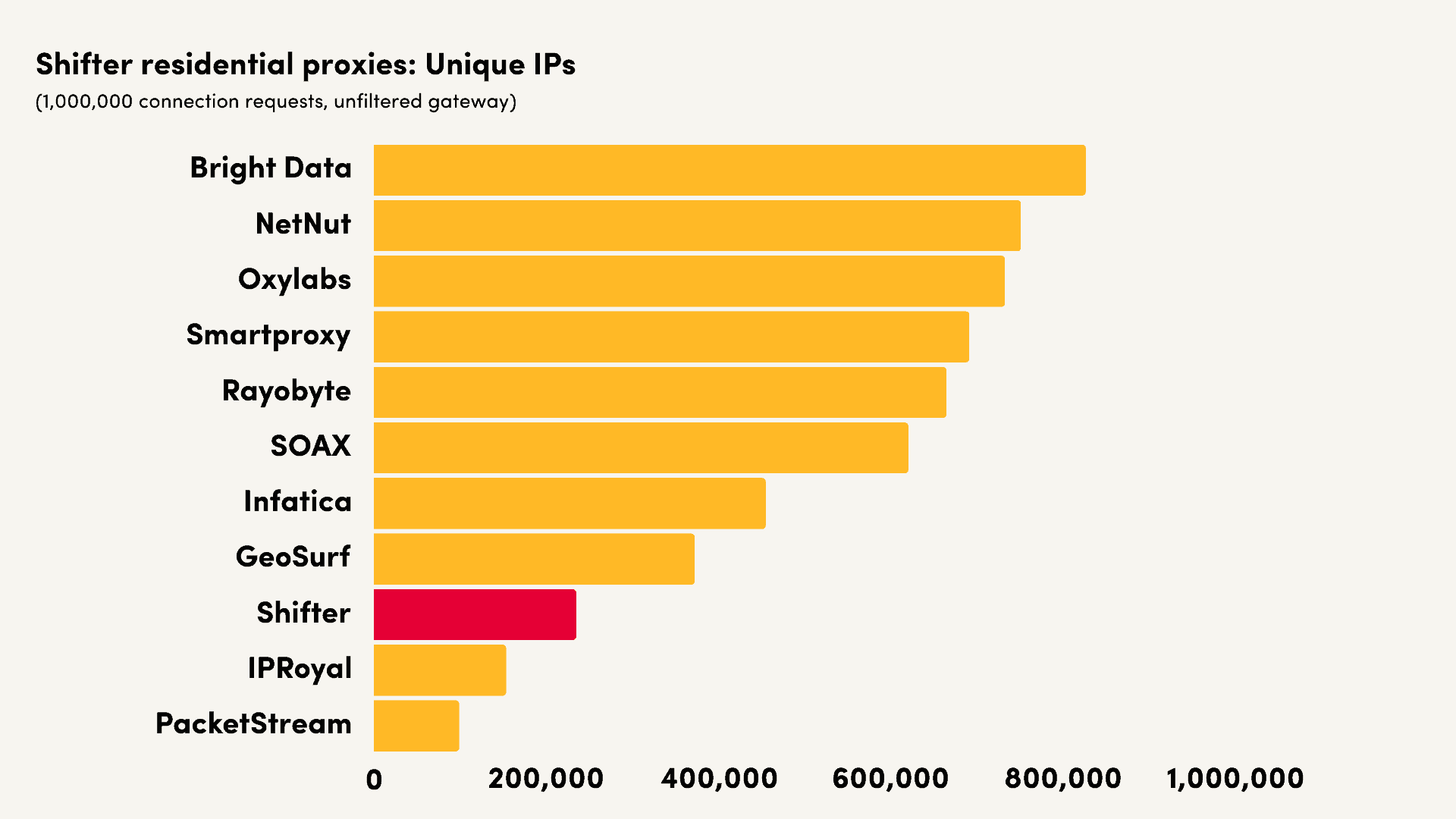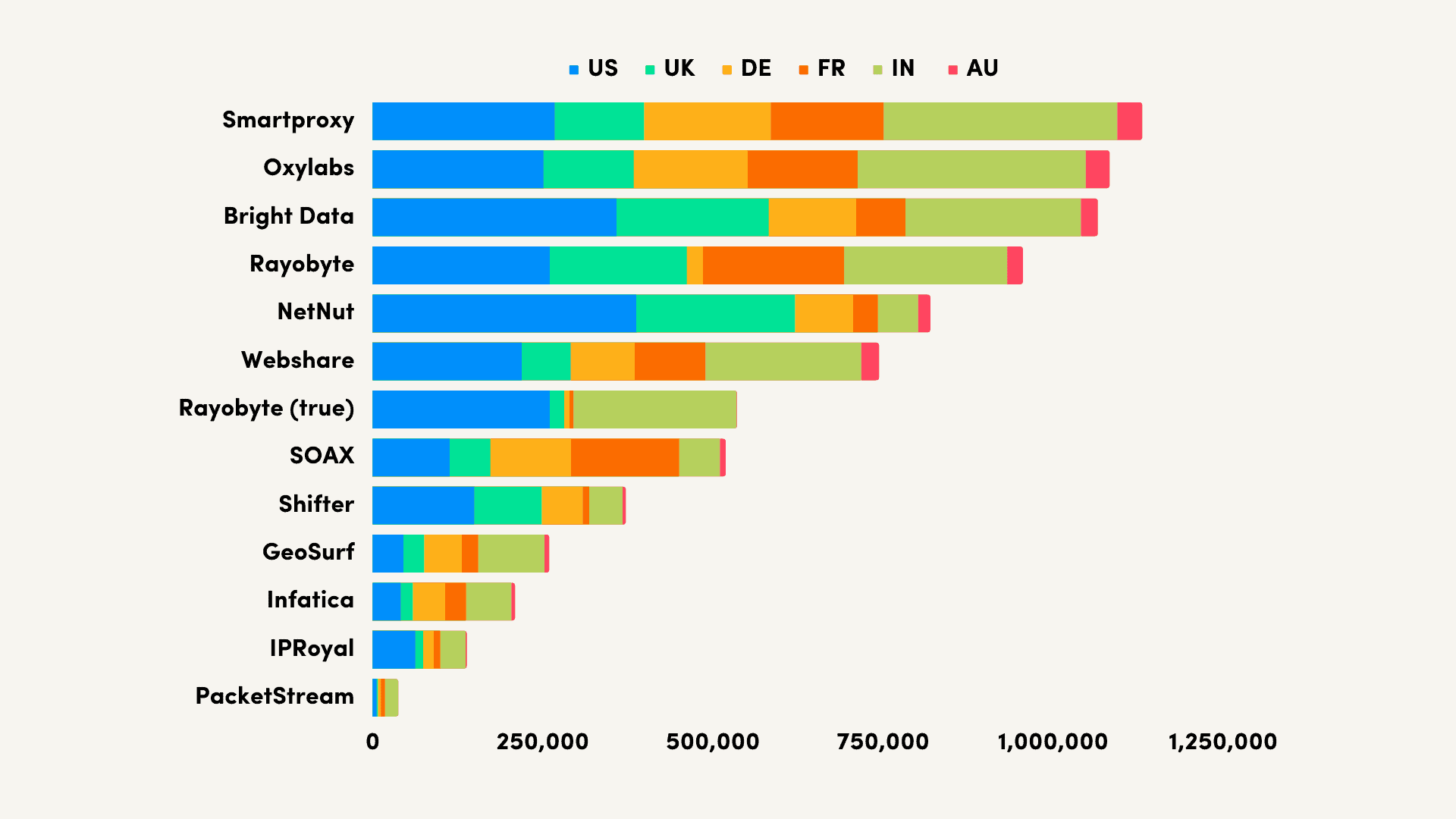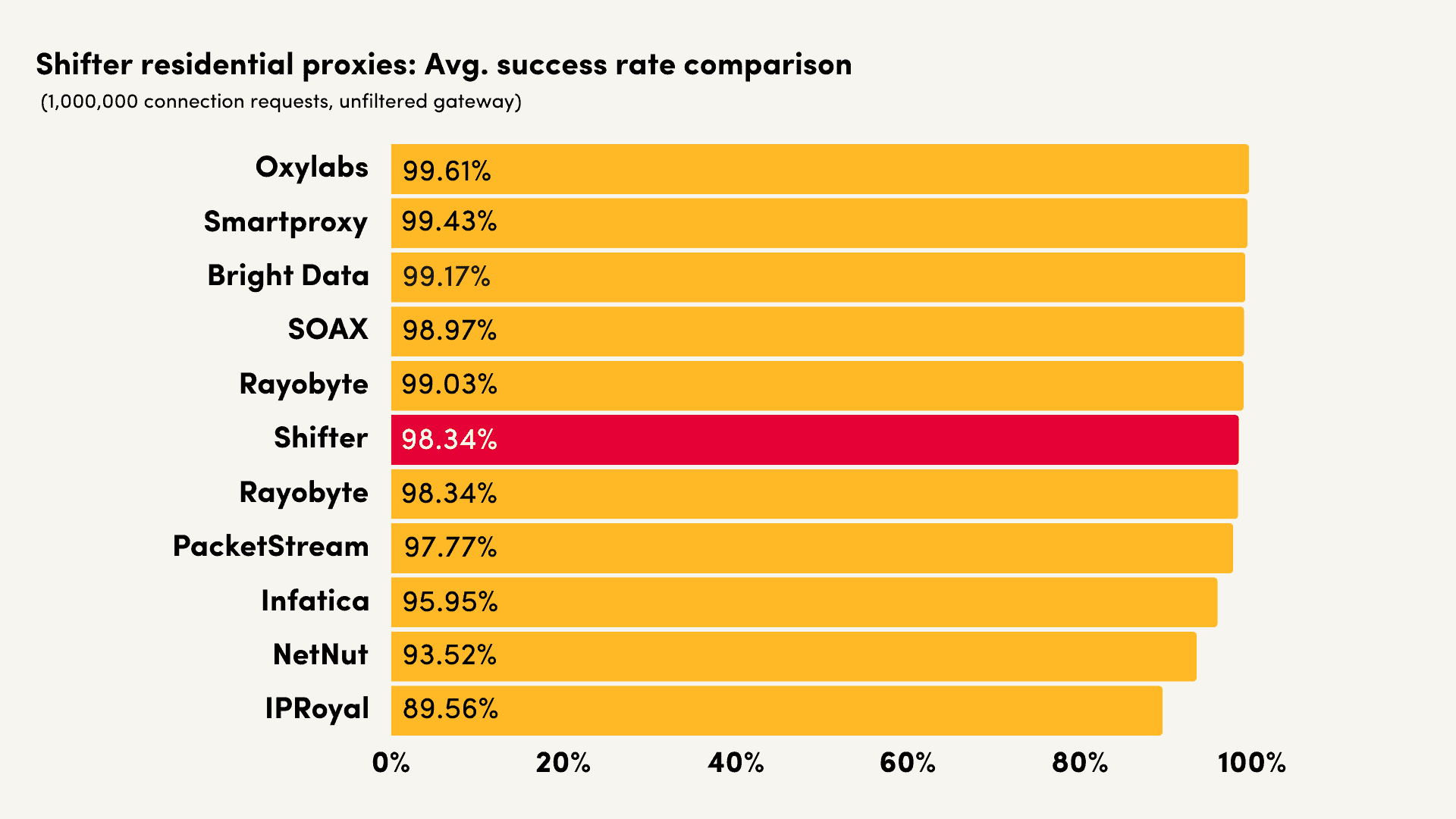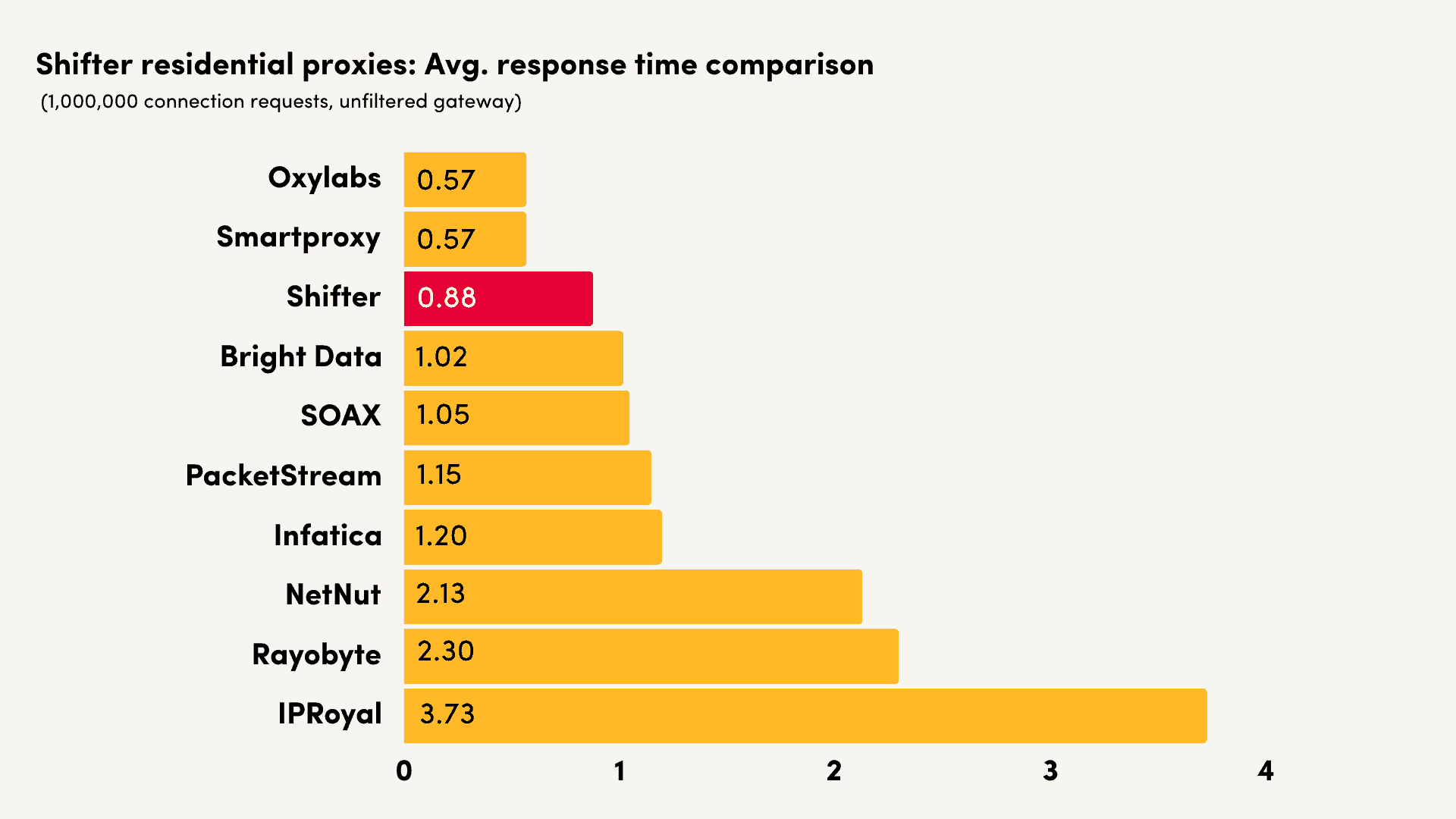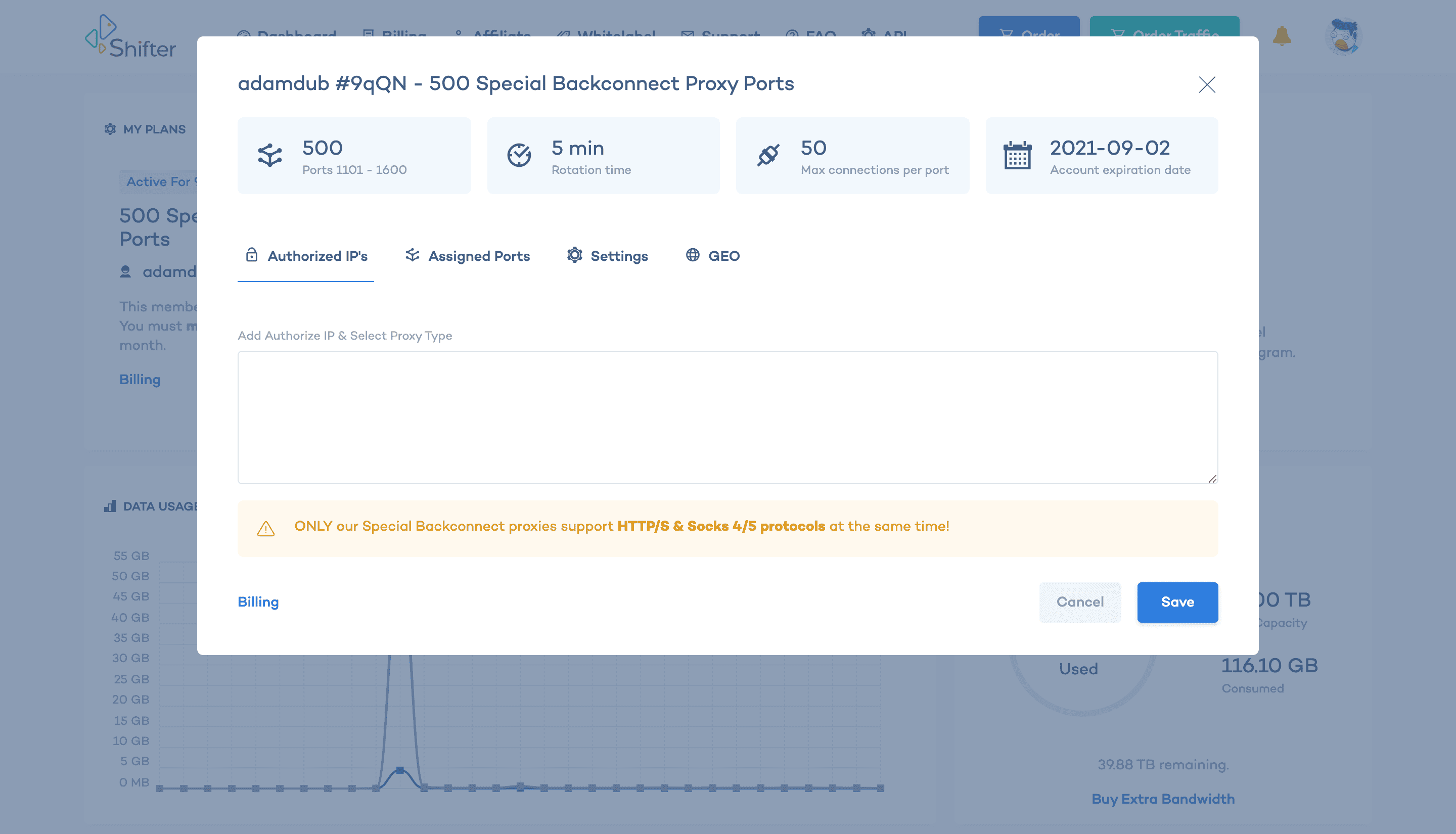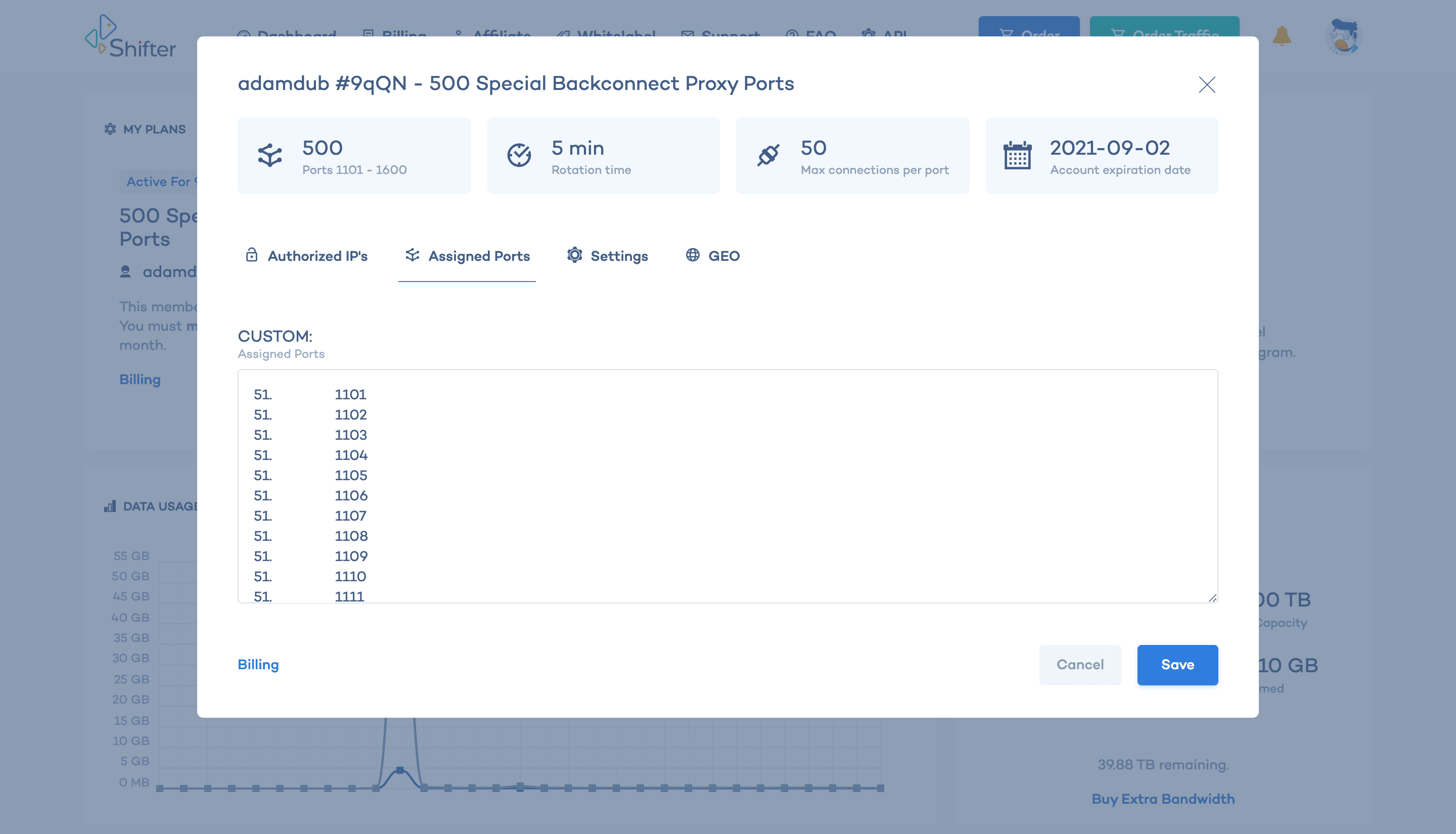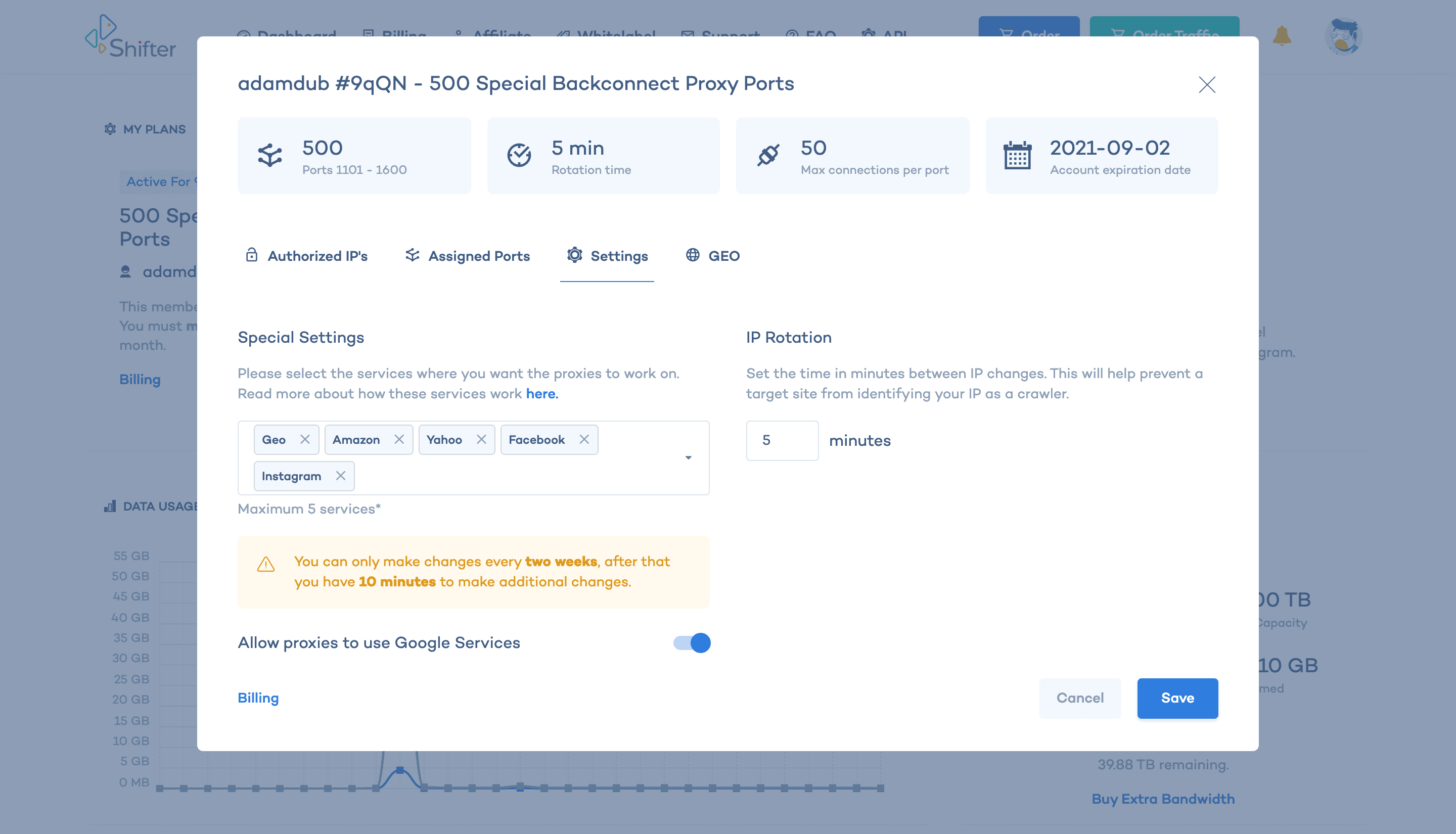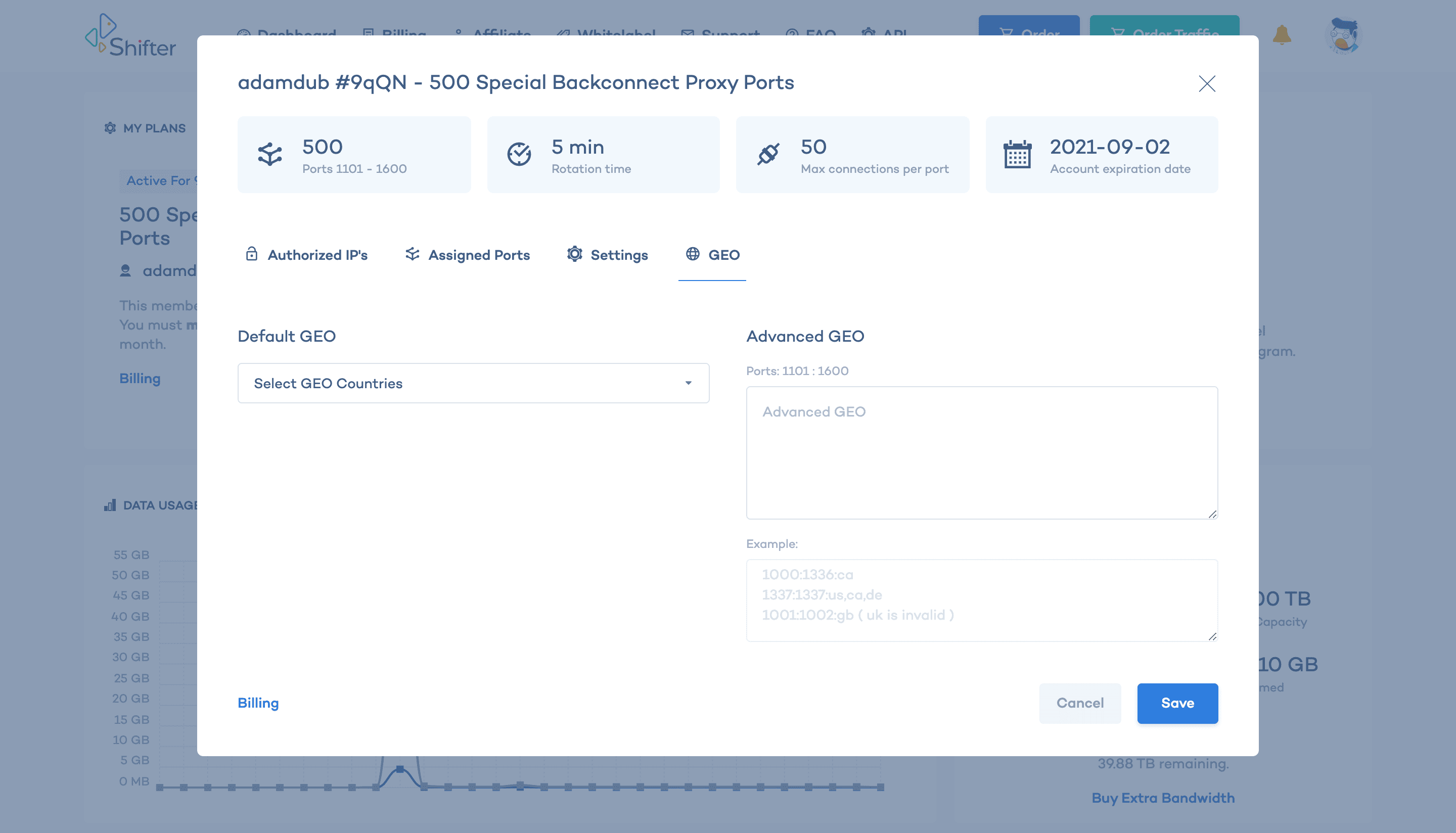
Shifter Review
Shifter’s proxies have fallen behind in features, but they offer competitive performance and a pricing model that’s based on ports rather than gigabytes.
Shifter is a well-known name in the proxy server industry. The provider got famous for its unlimited traffic plans that charged by ports. This is no longer the case, but you can still get a lot of traffic for less than other premium alternatives.
Though Shifter has been on the down-low lately, it remains a force to be reckoned with. Let’s explore where its residential proxies stand in late 2023.
General Information
| Country | Unknown |
| Founded | 2012 |
| Proxy networks | Residential ISP (dedicated) |
| Web scrapers | General-purpose API SERP API E-Commerce API |
| Other tools | Cloud hosting |
| Price range | Premium |
| Starting price | $100 |
| Payment methods | Credit card, PayPal, wire transfer, crypto |
| Trial | Available |
Shifter Residential Proxies
Residential proxies are Shifter’s main service. The provider advertises around 30 million IPs from all around the world.
The service comes in three varieties: Basic, Special, and Fast Rotation plans.
- The Basic option provides no control over IP geolocation whatsoever (IPs are assigned randomly from Tier 2 & 3 countries) and blocks popular websites like Google, Amazon, or social media.
- The Special plans remove these limitations; but even then, you have to specify up to five major targets which you’ll access. It’s possible to adjust the setting every two weeks.
- The Fast Rotation plans are identical to Special, but they increase the rotation frequency.
Features
Basic functionality.
Format: Proxy pool with 30M IPs | Threads: 50 per port Traffic: Plan based SOCKS5: ✅ Authentication: IP whitelist |
Shifter’s residential proxies include most of the basic features you’d expect: ability to target countries, controllable rotation settings, and SOCKS5 support.
However, they’ve fallen behind premium alternatives. There’s no way to select a city or ASN, authenticate using credentials, or change an IP with every connection request – even with the Fast Rotation plan.
In addition, the Basic plans don’t support SOCKS5, which some may find important.
Pricing Plans
Port based pricing with a big traffic allowance.
| Model: Subscription Format: Ports, traffic Self-service: ✅ | Starting price: $99.98 for 200 GB & 5 ports Upsells: Geotargeting, premium domains, faster IP rotation Trial: 7 days for companies, 3-day refund |
Shifter uses a subscription based model, charging every month. It’s impossible to upgrade a plan during a subscription period, but you can get more than one plan.
Unlike most residential proxy providers, Shifter uses ports as the main metric. You can get anywhere from 5 to 1,000 ports. Each port comes with 40 GB of traffic, which translates to $0.6/GB. This is very cheap compared to premium alternatives, which still charge $4-5 for a terabyte of traffic, but the caveat is that you’ll be limited by how fast you can scrape.
If you get short on traffic, Shifter offers the possibility to buy extra without getting a new plan. It’s nice that this extra traffic never expires.
The second caveat is that Shifter’s pricing starts from ~$100/month. This alone would be pricey for many small businesses, but the Special plans charge double. So, in reality, most clients will want a plan that costs at least $200. Opting for faster rotation adds an extra ~25%.
A 100-port plan will make your wallet lighter by $10,000. Due to Shifter’s model, it’s hard to compare it with other proxy vendors. Still, I can safely consider it a premium provider.
Companies can get a 7-day trial, while regular users are eligible for a 3-day money-back guarantee if they’re unhappy with the service. The threshold is 50% of a plan’s traffic limit (can’t refund if you’ve used more), which is generous.
Performance Benchmarks
Strong performance compared to previous years.
#1: Pool size & composition
We ran 1M requests over 21 days using the unfiltered pool, 500,000 requests over 14 days using the country pools, and 140,000 connection requests over 7 days using the Australian pool. We enriched IP data with the IP2Location database.
| Gateway | Unique IPs | Residential % |
| Random | 235,256 | 94.99% |
| US | 149,075 | 79.83% |
| UK | 99,075 | 93.58% |
| Germany | 60,331 | 93.44% |
| France | 9,471 | 77.27% |
| India | 48,748 | 96.67% |
| Australia | 4,884 | 72.20% |
Shifter had a decently big pool. Though the number of IPs wasn’t that large when using the unfiltered gateway, we found nearly 150,000 residential proxies in the US, and almost 100,000 in the UK. This should be enough for any task. For some reason, there were comparatively few IPs in France, which shows that the network may not be perfectly balanced.
Another interesting find: Shifter’s unfiltered (Random) gateway was largely composed of proxies from Tier 2 & 3 countries: India, Philippines, Indonesia, and the like. If I had to guess, I’d say that this is the pool that comes with Shifter’s Basic packages, with individual country gateways added for Special plans.
#2: Infrastructure performance
This benchmark shared the same parameters as the pool test. Our computer was located in Germany. We targeted a global CDN – it pinged a server nearest to the proxy IP and had a response size of several kilobytes.
| Gateway | Avg. success rate | Avg. response time |
| Random | 98.43% | 0.88 s |
| US | 98.45% | 1.00 s |
| UK | 98.53% | 0.80 s |
| Germany | 98.52% | 0.49 s |
| France | 99.10% | 0.44 s |
| India | 98.83% | 1.06 s |
| Australia | 99.04% | 1.44 s |
Shifter’s infrastructure performed well and rarely failed. Most of the errors we received were 503 (server maintenance or overload), which differed from the usual culprit with residential proxies – timeouts.
The proxies were also really fast. Throughout our years of testing Shifter, we were used to seeing it among the slowest providers. However, the company evidently made serious infrastructure improvements, as this time around it could rival even the fastest competitors.
#3: Performance with popular targets
We made ~2,600 connection requests to each target using US-filtered proxies and a non-headless Python scraper. Our computer was located in Germany. Note that your results may differ based on your web scraping setup.
| Website | Avg. success rate | Avg. response time |
| Amazon | 89.61% | 3.59 s |
| 83.23% | 1.79 s | |
| Social Media | 81.81% | 1.68 s |
| Walmart | 98.73% | 2.18 s |
| Total | 88.27% | 2.31 s |
How to Use Shifter
Registration
To register with Shifter, you’ll need to enter:
- Your first and last name,
- Email address,
- Username,
- Password,
- And how you found out about the service.
Then, Shifter will send a confirmation email (which may end up in your spam folder), and you’re in. Unlike most other providers, Shifter doesn’t require undergoing a KYC procedure.
Dashboard
Shifter provides a comfortable dashboard for managing your interactions with the service. It shows your plans (both active and expired), lets you add money and buy a plan, download invoices, set up proxies, check traffic use, and contact support.
A significant part of the dashboard is dedicated to referrals and whitelabeling, showing that Shifter emphasizes these activities. However, I’m not sure if they’re very relevant for regular users.
Some other quality of life features include automated traffic alerts at different traffic thresholds and the ability to lock the dashboard until you enter a password.
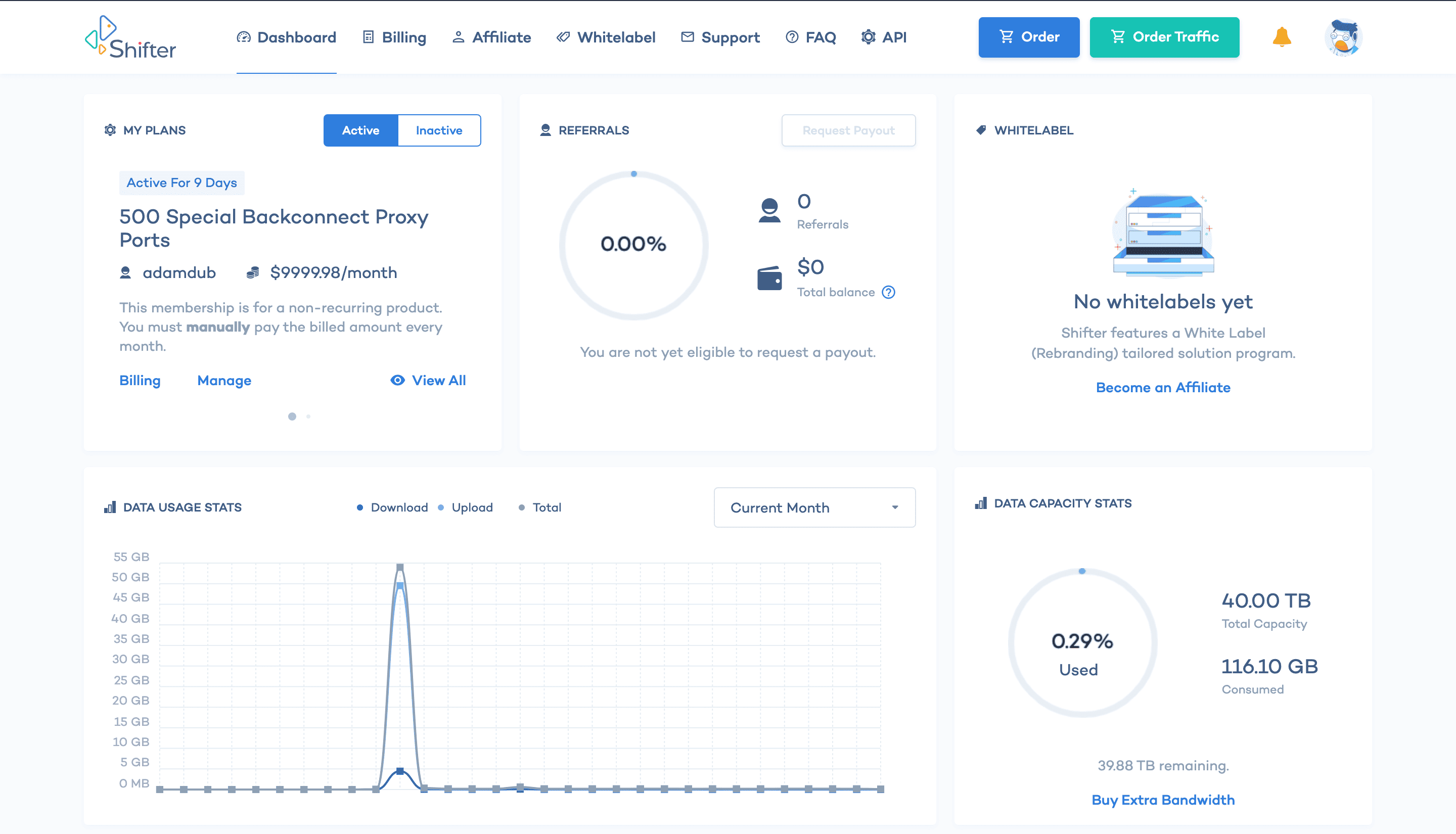
Subscription Management
Shifter provides two ways to buy a plan: by paying directly or adding money to a wallet and then making the purchase. There’s full self-service if you’re using a card or PayPal; crypto and wire transfers require contacting support.
The provider gives the choice between activating a one-time or recurring subscription. It’s possible to have multiple plans active for one product at once.
You can view all plans on the dashboard, along with their status. Shifter automatically generates downloadable invoices in the .pdf format.
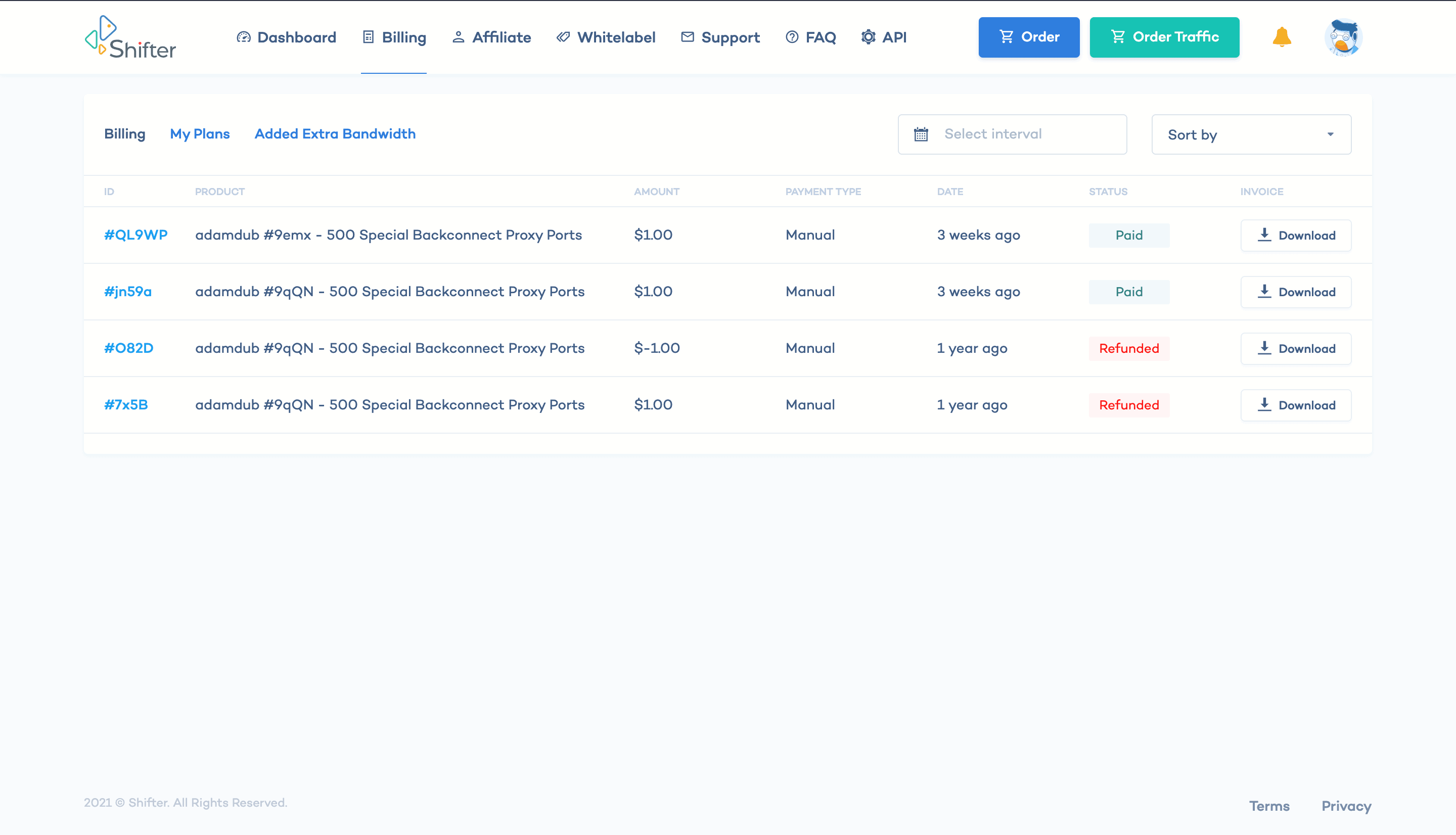
Proxy Management
Shifter’s residential proxy setup procedure involves four steps:
- Whitelist IP addresses that will access the proxies.
- Select up to five services (websites) which you’ll target. This only applies to Special plans.
- Specify the rotation time, between five and 60 minutes.
- Select one or multiple locations to get IPs from.
Then, you’ll get a list of backconnect proxy servers in the form of IP:port. The widget works well, but it lacks dynamic code samples that would simplify integration with major programming libraries.
Usage Tracking
Shifter provides a graph on the dashboard’s main page. It shows the upload, download, and combined traffic statistics for several time intervals: one, three, six, or 12 months. This is great for monitoring long-term use but not so great if you need to see your last day or week’s metrics.

Documentation
Shifter has a searchable knowledge base for general, product-specific, billing questions, and troubleshooting. It does a good job of answering the main concerns and organizing them by popularity.
One thing that I lacked was integration instructions with popular web scraping tools. Shifter does offer in-house integration support, but it’d also be helpful to have this information publicly available to dispel pre-purchase compatibility considerations.
This may be relevant given Shifter’s infrastructural choices: no username:password authentication and the IP:port format for its residential proxy service.
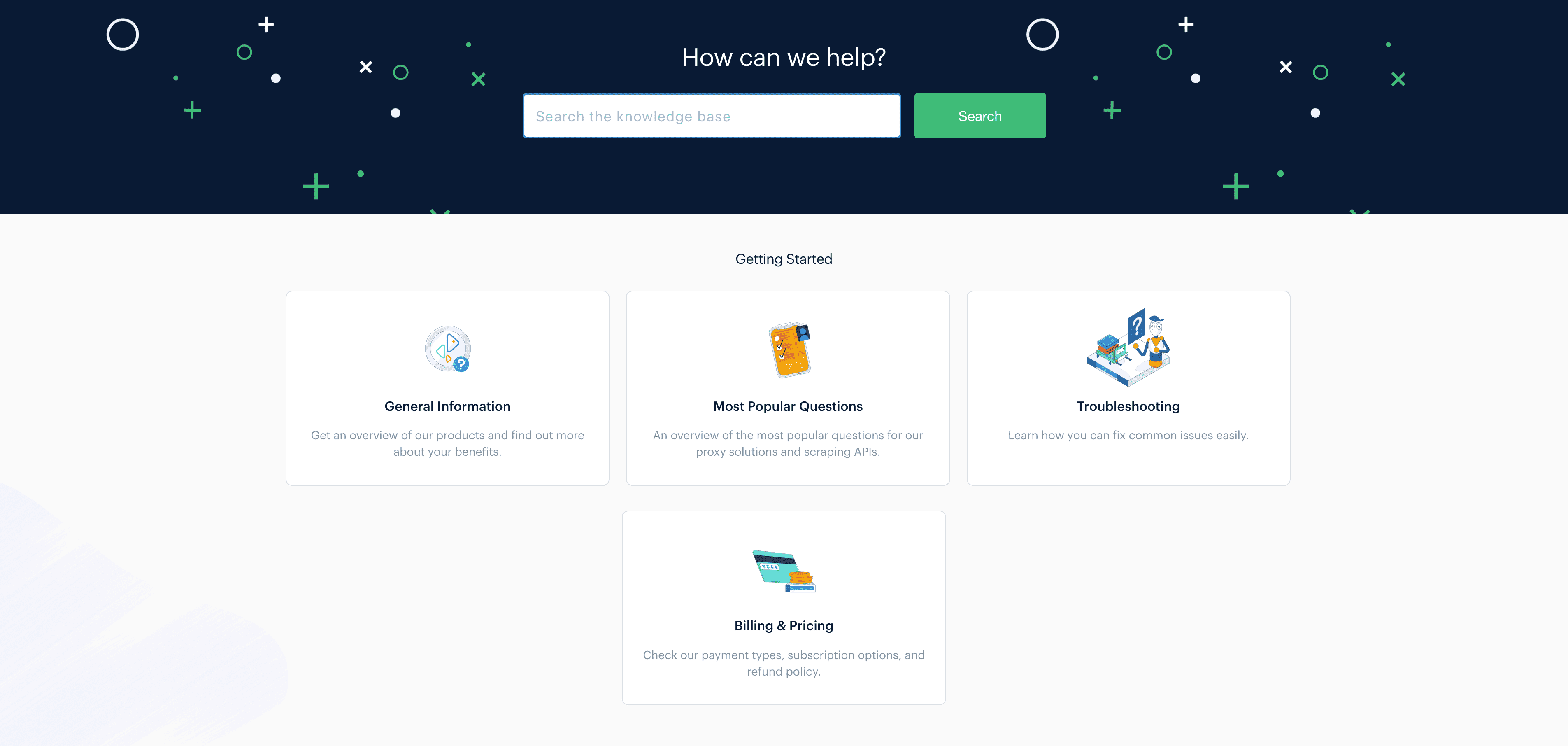
Hands-On Support
You can get support over email or live chat on the website. Shifter informs that email queries receive replies in several hours. I tried the live chat – a customer service agent replied within two minutes and was able to provide the help I needed.
Overall, I had a good experience, at least when asking simple questions.
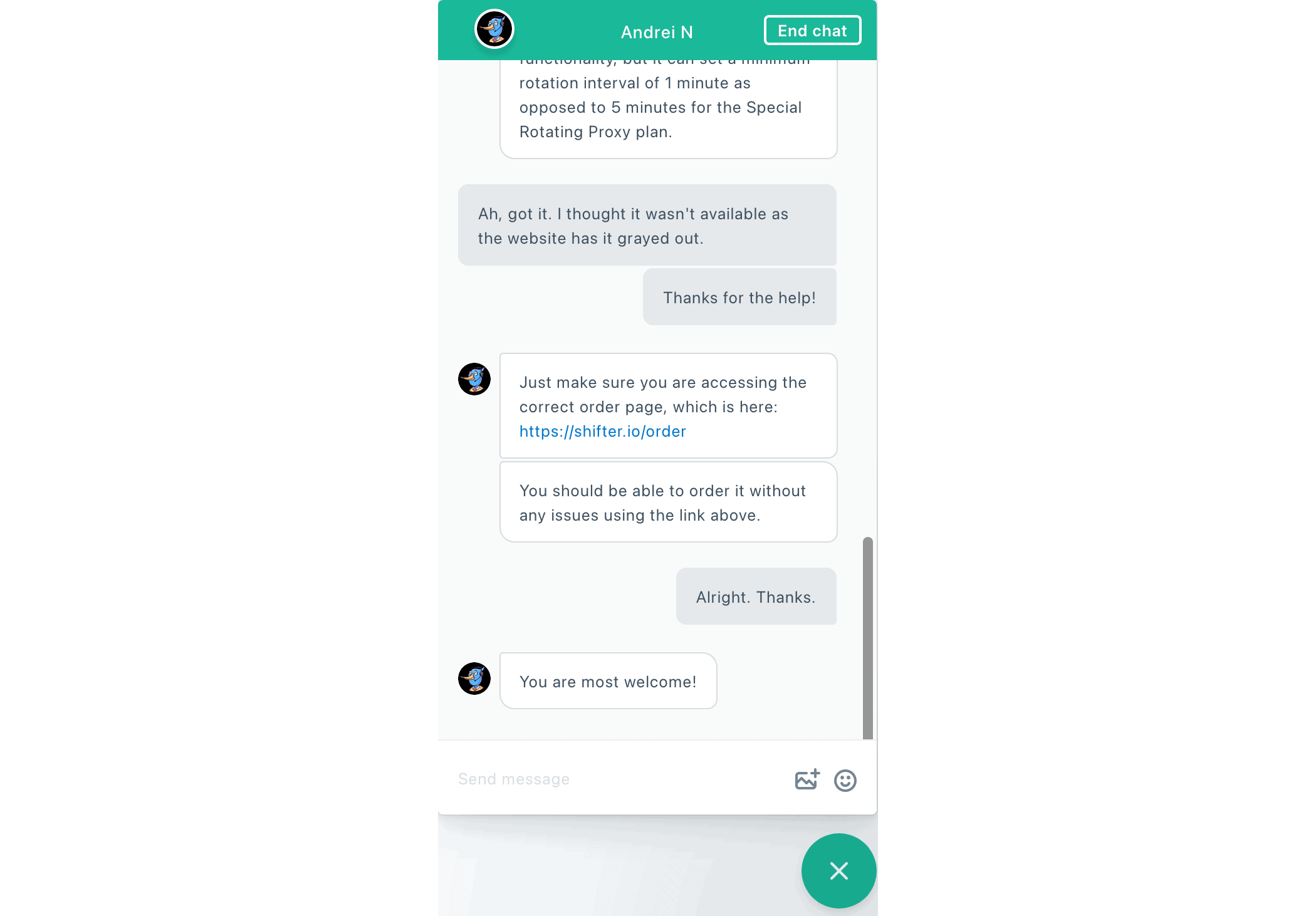
Conclusion
Shifter is an interesting case. It’s a mysterious company with a questionable history and unconventional pricing. The provider has also fallen behind in features compared to most modern alternatives.
On the other hand, Shifter’s residential proxy network is large and works well. In addition, you get an unconventional pricing model with a generous traffic allowance. If you can navigate the port and rotation restrictions, there’s potentially a lot of money to be saved.
This is probably Shifter’s main draw and a strong argument for companies that use residential proxies to run traffic-intensive tasks.
Shifter Alternatives

Oxylabs has a larger proxy pool, better performance, and no concurrency limits. In exchange, you’ll be paying more for traffic – as with the majority of residential proxy providers.

Decodo is another terrific pick for quality proxies. Its rates are lower than most premium competitors until a terabyte of data, and you barely have to make any compromises.

SOAX can be a great option if you need more control over location targeting or IP rotation. Its rates are also favorable for a premium-quality service.
Recommended for:
Businesses that value traffic volume over scraping speed.
